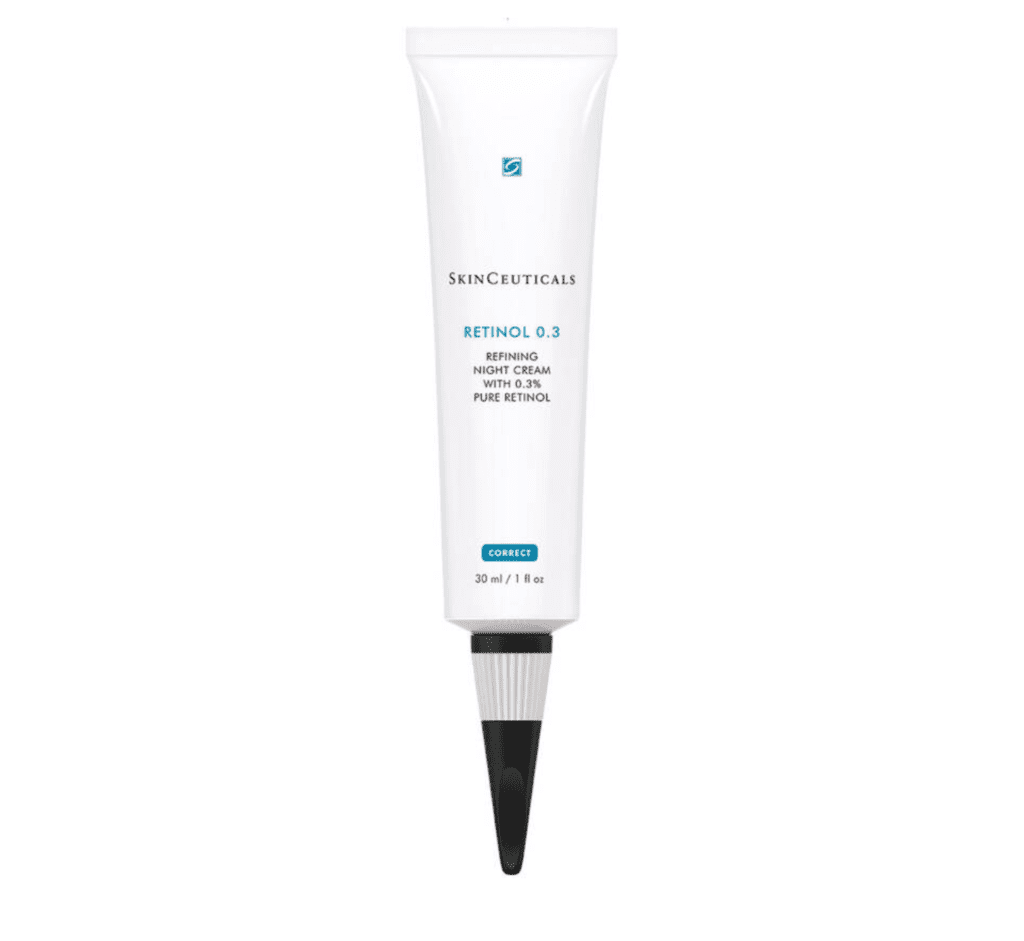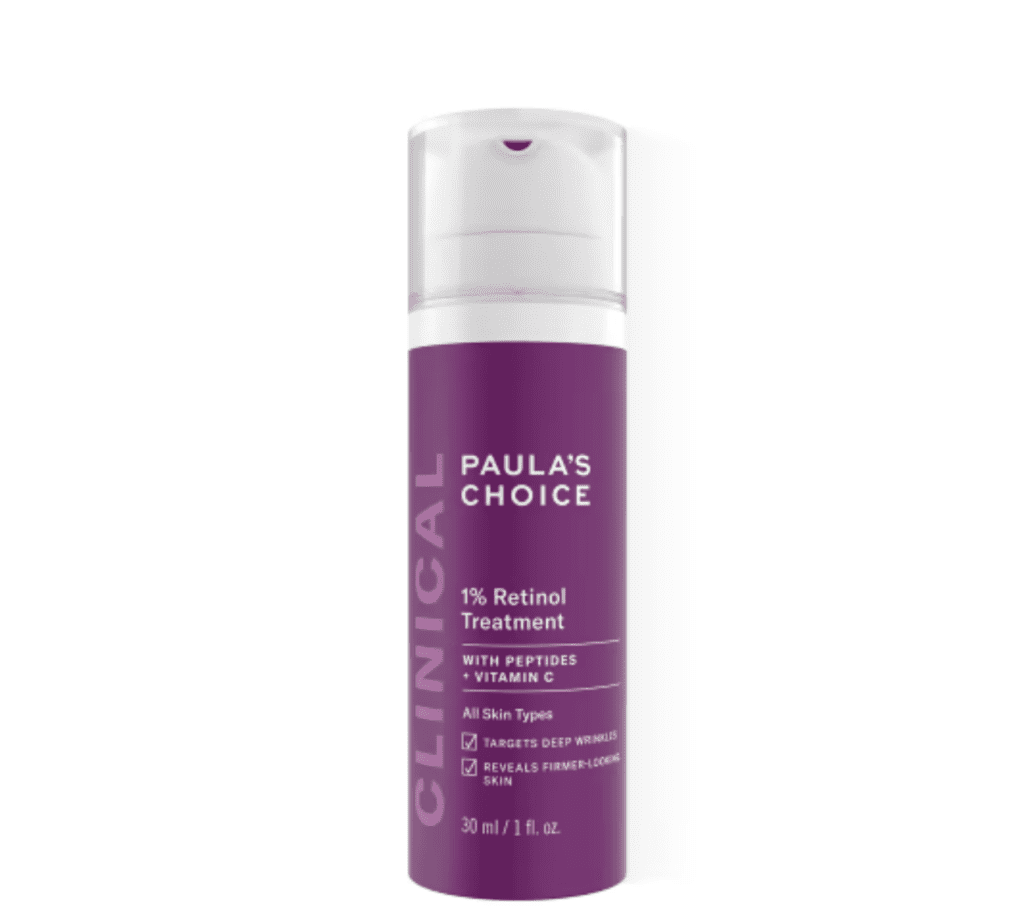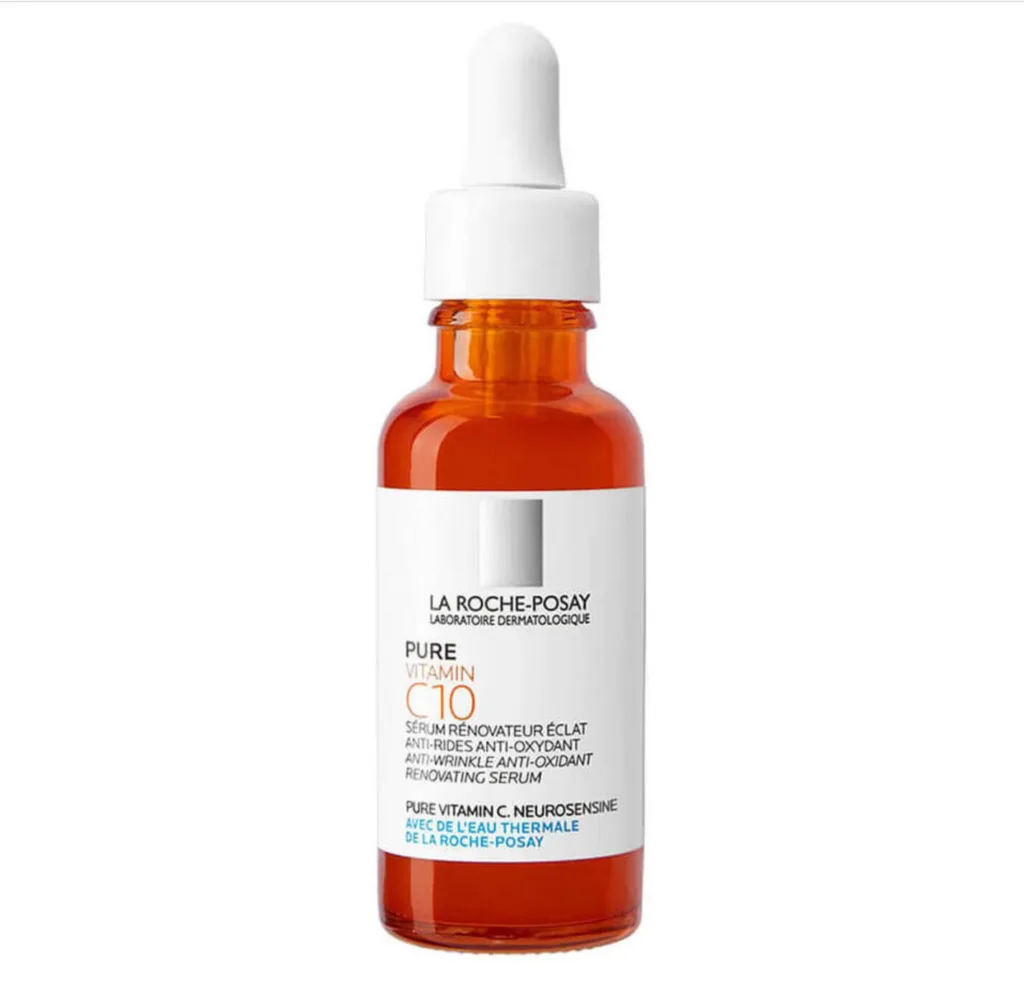
Retinol and vitamin C are frequently mentioned buzzwords in the world of skincare, renowned for their distinctive benefits.
Vitamin C, a potent antioxidant, plays a pivotal role in collagen synthesis and protection against environmental damage. It is a favourite for those looking to brighten their complexion and ward off signs of ageing.
Retinol is a vitamin A derivative and is lauded for its ability to promote cell turnover and enhance skin renewal, aiming to improve texture and tone.
While both ingredients can be powerful allies in maintaining skin health, their interaction is complex, and their usage requires a thoughtful approach.
What is Vitamin C?
Vitamin C, or ascorbic acid, is a crucial nutrient your body needs to maintain various tissues and carry out certain biochemical functions. This vitamin is not synthesised by the body and, therefore, must be ingested via your diet or applied topically in skincare products.
To incorporate the full spectrum of its benefits, include vitamin C-rich products in your skincare regimen and consume foods naturally high in this nutrient. Remember to wear sunscreen, as vitamin C can increase sun sensitivity.
Benefits of Vitamin C
Vitamin C is a powerful antioxidant that plays a vital role in maintaining the health and vitality of your skin. When incorporated into your skincare routine, it can help neutralise free radicals, which are unstable molecules that can damage cells and lead to premature ageing.
Vitamin C also plays an essential role in collagen synthesis. It is vital for stabilising collagen molecules, which adds structure to your skin, keeping it firm and youthful. Also, vitamin C has been proven to reduce inflammation and, by encouraging healthy collagen production, it assists in the skin’s natural regeneration process, thus promoting a more rejuvenated complexion.
In addition to its anti-ageing properties, vitamin C is celebrated for its brightening effects, making it a must-have if you want to achieve a bright complexion and even out your skin tone.
It can also assist in fading dark spots and reducing the appearance of hyperpigmentation, contributing to a more uniform skin colour and texture.
When using vitamin C, you need to be consistent. Regular application can lead to visible improvements over time, reaffirming vitamin C’s status as a staple in skincare for a radiant and youthful complexion. However, using it correctly and in the right concentration is essential to reap the maximum benefits for your skin.
What is Retinol?
Retinol is a potent form of vitamin A, widely acclaimed for its ability to rejuvenate your skin by accelerating cell turnover and boosting collagen production.
It belongs to a broader family called retinoids, but unlike its prescription cousins, retinol is available over the counter.
Benefits of Retinol
Retinol has become immensely popular due to its impressive array of skincare benefits. This versatile ingredient boasts a multitude of qualities that address various skin concerns.
One of retinol’s most renowned attributes is its powerful exfoliating and cell turnover effects. It gently sloughs away dead skin cells on the surface while stimulating the production of new ones underneath. This dual exfoliating action reveals smoother, brighter, and more even-toned skin.
In addition, retinol dives deep into the dermis, the middle layer of the skin, where it boosts collagen and elastin synthesis. These are vital proteins responsible for skin plumpness and elasticity. By stimulating their production, retinol helps diminish the appearance of wrinkles, fine lines, and age spots associated with loss of firmness.
Retinol is also acclaimed for its acne-fighting prowess. It helps regulate excess sebum production, which can cause breakouts. Its exfoliating properties also keep pores clear of dead skin cells, oils, and bacteria that lead to acne. Retinol not only treats existing breakouts but also prevents future ones.
Furthermore, retinol is a key ingredient when it comes to fading hyperpigmentation and sun damage. It works by inhibiting melanin synthesis, which results in skin darkening and uneven tone. With consistent use, retinol leads to a brighter and more even complexion.
Finally, retinol provides antioxidant protection. While not its primary role, retinol helps neutralise free radicals that cause skin ageing and damage.

Incorporating Retinol and Vitamin C Into Your Skincare Routine
Retinol and Vitamin C are powerhouse skincare ingredients that can substantially improve your skin’s appearance when used together. However, to maximise their benefits and minimise any potential irritation, you should understand how to layer them correctly and be aware of the side effects they might have in combination.
Best Practices for Retinol
When introducing retinol into your skincare routine, start with a lower concentration to minimise irritation. Choose a retinoid form suited for your skin type, and always apply retinol after your skin is cleansed and dried. Incorporating a nourishing moisturiser can buffer the potent effects of retinol, thereby reducing the likelihood of sensitivity.
Best Practices for Vitamin C
Vitamin C, particularly in the form of ascorbic acid or L-ascorbic acid, is most effective when applied in the morning. Opt for serums that come in opaque, airtight bottles to maintain the antioxidant’s stability. If you have sensitive skin, look for serums designed to deliver the benefits without irritating.
Timing and Frequency of Use
Integrate retinol into your nightly routine slowly, beginning with use 1-2 times per week. Gradually increase the frequency as your skin builds tolerance. Apply Vitamin C every morning to protect against oxidative stress, using it as part of your daytime regimen to take advantage of its antioxidant properties.
Combining Retinol and Vitamin C for Maximum Benefit
While both ingredients offer significant benefits individually, their combined use can amplify their effectiveness, resulting in a more thorough anti-ageing approach.
How to Start Incorporating Retinol and Vitamin C into Your Routine
As you consider integrating retinol and vitamin C into your skincare regimen, it’s essential to understand what each ingredient does and the benefits they offer. Vitamins C and A derivatives are proven to be powerful in promoting skin health with their antioxidant and skin-renewing properties. However, you must carefully introduce them to prevent adverse reactions and maximise their efficacy.
What to Look For When Choosing Retinol and Vitamin C
Read labels carefully; the percentage of active ingredients, like retinol and vitamin C, influences both effectiveness and the likelihood of irritation. For retinol, products typically range from 0.1% to 1%, whereas vitamin C might be found in concentrations between 10% and 20%. Higher isn’t always better, especially if your skin is sensitive.
To ensure you’re getting the best results, focus on the quality of the skincare products you select. Look for reputable brands with a track record of clinical research backing their formulations.
Some popular options are:

La Roche-Posay: Their Retinol B3 Serum is a lightweight formula that contains encapsulated retinol to provide sustained release and minimise irritation. It also features niacinamide, a vitamin B3 derivative, to boost collagen production and reduce the appearance of fine lines and wrinkles.
SkinCeuticals: Their Retinol 0.3% + Ferulic Acid is a concentrated formula that combines retinol with ferulic acid, a powerful antioxidant that stabilises retinol and enhances its effectiveness.


Paula’s Choice: Their Clinical 1% Retinol Treatment is a potent skincare solution designed to combat signs of ageing. It features a high-strength one percent concentration of retinol, known to help diminish the appearance of fine lines and wrinkles, improve skin texture, and promote a more even skin tone.
La Roche-Posay: Their 10% Pure Vitamin C Serum is an anti-ageing face serum with 10% pure vitamin C to brighten dull skin and reduce signs of ageing. It also contains salicylic acid to smooth skin texture and neurosensine to soothe sensitivity.

When to Apply Each Product for Optimal Results
Retinol is renowned for its anti-ageing and skin-renewing properties, but it is best applied at night due to its sensitivity to sunlight.
On the other hand, Vitamin C is an antioxidant that helps protect the skin against environmental damage and is ideal for morning use. To achieve optimal results:
- In the morning:
- Cleanse your skin thoroughly.
- Apply a Vitamin C serum to help fend off free radicals and enhance skin brightness.
- Follow up with sunscreen, as Vitamin C can increase your skin’s photosensitivity.
- In the evening:
- After cleansing, apply retinol to aid cell turnover and improve skin texture and tone.
Wait for at least 30 minutes before applying your usual moisturiser to help buffer any irritation without affecting the retinol’s efficacy.
Potential Side-Effects When Using Both Together
When introducing both Retinol and Vitamin C into your skincare routine, your skin may experience temporary side effects such as redness, peeling, or sensitivity. It is important to:
- Start with lower concentrations and gradually increase as your skin builds tolerance.
- Always patch-test new products to check for adverse reactions.
- Consider using the two ingredients on alternate days if combining them leads to pronounced discomfort.
Remember, if irritation persists, consult a dermatologist. Using Retinol and Vitamin C is a powerful combination, but your skin’s health and comfort should always come first.
Specific Concerns and Skin Types
Incorporating retinol and vitamin C into your skincare routine should be tailored to address specific skin issues such as acne, pigmentation, and the signs of ageing while also considering your skin sensitivity.
Acne and Breakouts
Retinol is widely recognised for its ability to promote cell turnover and reduce inflammation, making it a potent ingredient for targeting acne and breakouts. It helps to clear pores and minimise the formation of new acne. Regular use of retinol can lead to smoother skin with fewer blemishes.
Pigmentation and Dark Spots
Vitamin C, as a powerful antioxidant, helps to lighten pigmentation and dark spots. It works by inhibiting melanin production, which can help to even out skin tone and enhance radiance. For optimal results, incorporate vitamin C into your morning routine, as its properties also protect the skin from environmental stressors.
Anti-Ageing and Prevention of Fine Lines
Both retinol and vitamin C stimulate collagen production, an essential protein for maintaining skin elasticity and strength, thereby tackling fine lines and wrinkles. Retinol, in particular, penetrates deep into the skin to support the skin’s structure, while vitamin C provides a brightening effect, giving a more youthful appearance.
Effectiveness of Retinol and Vitamin C on Different Skin Types
Different skin types can respond uniquely to retinol and vitamin C. Oily and combination skin types may tolerate retinol well, seeing improvements in texture and a reduction in acne.
Dry skin might require additional moisturisation when using retinol due to its exfoliating nature. Vitamin C suits all skin types and is especially effective in brightening dull complexions and reducing the appearance of hyperpigmentation.
To achieve maximum efficacy and minimise irritation, choose the concentration and formulation of your skincare products based on your skin type.
Dermatologists’ Recommendations
Dermatologists assert that retinol effectively enhances collagen production and accelerates cell turnover. When incorporating retinol and vitamin C together, they advise caution due to potential skin sensitivity. They recommend using retinol in the evening and vitamin C in the morning to offset any irritation and maximise effectiveness, as vitamin C can help protect the skin against free radical damage during the day.

Summary and Final Thoughts
In the realm of skincare, you’ve likely encountered both retinol and vitamin C, known for their skin-rejuvenating qualities. While retinol, a derivative of vitamin A, is celebrated for its ability to renew skin cells and reduce the appearance of ageing, vitamin C is a potent antioxidant that can brighten your skin and help protect against environmental damage.
Combining these two ingredients in your skincare routine warrants a cautious approach due to their differing pH levels and potential for irritation.
However, when used correctly, such as applying vitamin C in the morning and retinol at night, you can reap the benefits of both without over-stressing your skin.
- Vitamin C:
- Antioxidant properties
- Brightens skin
- Supports collagen production
- Retinol:
- Promotes skin renewal
- Reduces fine lines and wrinkles
- Improves skin texture
Remember, introducing these active ingredients gradually allows your skin to build tolerance and minimises potential adverse effects. Always pay attention to your skin’s response and consider consulting a dermatologist to tailor a routine that’s right for your skin type and concerns.
Lastly, be diligent with sunscreen use, as both ingredients can increase your skin’s sensitivity to sunlight.